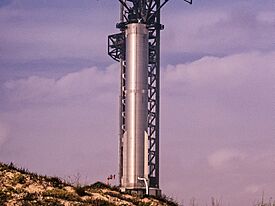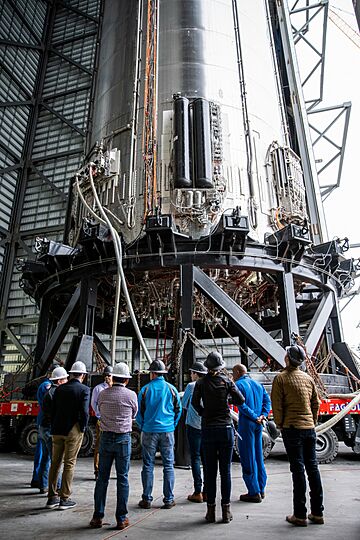SpaceX Super Heavy facts for kids

Booster 7 on the Orbital Launch Mount at Starbase in February 2023. B7 was the only booster to launch without a Vented Interstage.
|
|
| Manufacturer | SpaceX |
|---|---|
| Country of origin | United States |
| Used on | SpaceX Starship |
| General characteristics | |
| Height | 71 m (233 ft) |
| Diameter | 9 m (30 ft) |
| Gross mass | 3,600 t (7,900,000 lb) |
| Propellant mass | 3,400 t (7,500,000 lb) |
| Empty mass | 200 t (440,000 lb) |
| Launch history | |
| Status | In development |
| Total launches | 4 |
| Failed | 1 (IFT-1) |
| Other | Failed after staging (IFT-2, IFT-3) |
| First flight | April 20, 2023 |
| Super Heavy | |
| Engines | 33 Raptor engines |
| Thrust | 7,590 tf (74.4 MN; 16,700,000 lbf) |
| Specific impulse | 327 s (3.21 km/s) (sea-level) |
| Fuel | Liquid oxygen / Methane |
Super Heavy is the first stage of the SpaceX Starship super heavy-lift launch vehicle, which it composes in combination with the Starship second-stage. As of 2024, Super Heavy prototypes are being flight tested. Super Heavy flew for the first time on April 20, 2023, during the first orbital launch attempt of the Starship rocket.
Manufacturing
The manufacturing process starts with rolls of steel, which are unrolled, cut, and welded along the edge to create a cylinder of 9 m (30 ft) in diameter, 1.829 m (6.00 ft) in height, and 3.97 mm (0.156 in) thick, and around 1600 kg (3,600 lb) in mass.
These rings are stacked and welded along their edges to form the outer layer of the rocket. Domes are added early on in the assembly process, before final assembly of the tank sections begins.
Usually before final assembly of the vehicle, grid fins are added to the interstage, and chines are added after stacking the propellant tanks. After cryogenic testing, engines are installed, followed by the vented interstage.
Design
Super Heavy is 71 m (233 ft) tall, 9 m (30 ft) wide, and is composed of four general sections: the engines, the fuel tank, the oxygen tank, and the interstage. Elon Musk has stated that the final design will have a dry mass between 160 t (350,000 lb) and 200 t (440,000 lb), with the tanks weighing 80 t (180,000 lb) and the interstage 20 t (44,000 lb).
See also
- Starlink, large satellite constellation by SpaceX


